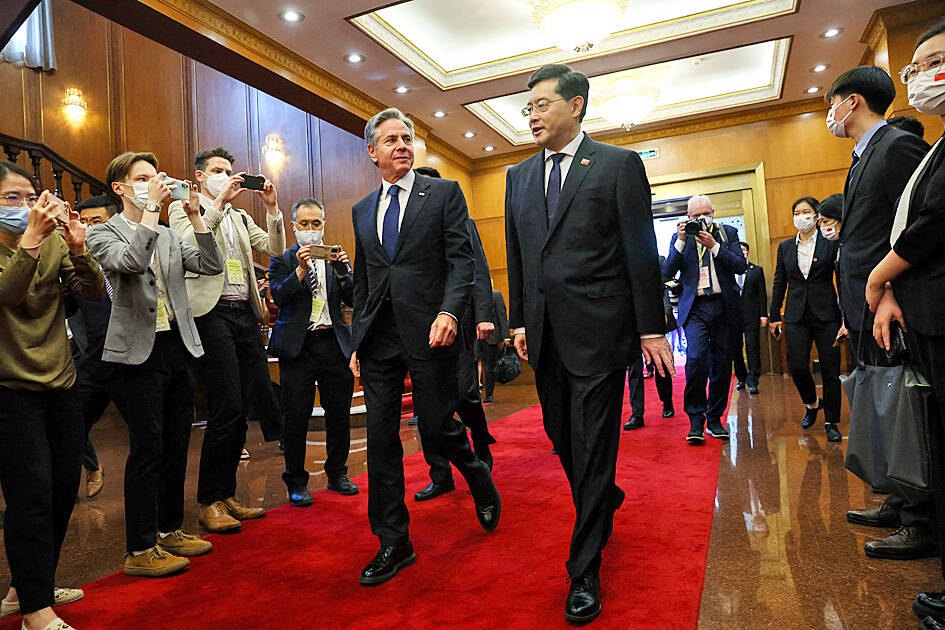US Secretary of State Antony Blinken yesterday started two days of high-stakes diplomatic talks in Beijing aimed at trying to cool exploding US-China tensions that have set many around the world on edge.
Blinken opened his program by meeting Chinese Minister of Foreign Affairs Qin Gang (秦剛) for an extended discussion to be followed by a working dinner.
He is to have additional talks with Qin, as well as Chinese Central Foreign Affairs Commission Director Wang Yi (王毅) and possibly Chinese President Xi Jinping (習近平) today.

Photo: AFP
Neither Blinken nor Qin made any substantive comments to reporters as they began the meeting at the Diaoyutai State Guesthouse.
Despite Blinken’s presence in the Chinese capital, prospects for any significant breakthroughs are slim, as animosity and recriminations have steadily escalated over a series of disagreements that have implications for global security and stability.
Blinken is the highest-level US official to visit China since US President Joe Biden took office and the first secretary of state to make the trip in five years.
Biden and Xi agreed to Blinken’s trip early at a meeting last year in Bali, Indonesia. It came within a day of happening in February, but was delayed by the diplomatic and political tumult brought on by the discovery of what the US says was a Chinese spy balloon flying across the US that was shot down.
Biden on Saturday played down the balloon episode as Blinken was heading to China.
“I don’t think the leadership knew where it was and knew what was in it and knew what was going on,” he told reporters.
“I think it was more embarrassing than it was intentional,” he added.
Biden said he hoped to again meet Xi after their lengthy and strikingly cordial meeting in Bali.
“I’m hoping that, over the next several months, I’ll be meeting with Xi again and talking about legitimate differences we have, but also how there’s areas we can get along,” Biden said.
The list of disagreements and potential conflict points is long, ranging from trade with Taiwan, human rights conditions in China and Hong Kong, to Chinese military assertiveness in the South China Sea and Russia’s war in Ukraine.
Xi offered a hint of a possible willingness to reduce tensions, saying in a meeting with Microsoft Corp cofounder Bill Gates on Friday that the US and China can cooperate to “benefit our two countries.”
“I believe that the foundation of Sino-US relations lies in the people,” Xi told Gates. “Under the current world situation, we can carry out various activities that benefit our two countries, the people of our countries, and the entire human race.”
Additional reporting by AFP

Taiwan is gearing up to celebrate the New Year at events across the country, headlined by the annual countdown and Taipei 101 fireworks display at midnight. Many of the events are to be livesteamed online. See below for lineups and links: Taipei Taipei’s New Year’s Party 2026 is to begin at 7pm and run until 1am, with the theme “Sailing to the Future.” South Korean girl group KARA is headlining the concert at Taipei City Hall Plaza, with additional performances by Amber An (安心亞), Nick Chou (周湯豪), hip-hop trio Nine One One (玖壹壹), Bii (畢書盡), girl group Genblue (幻藍小熊) and more. The festivities are to

Auckland rang in 2026 with a downtown fireworks display launched from New Zealand’s tallest structure, Sky Tower, making it the first major city to greet the new year at a celebration dampened by rain, while crowds in Taipei braved the elements to watch Taipei 101’s display. South Pacific countries are the first to bid farewell to 2025. Clocks struck midnight in Auckland, with a population of 1.7 million, 18 hours before the famous ball was to drop in New York’s Times Square. The five-minute display involved 3,500 fireworks launched from the 240m Sky Tower. Smaller community events were canceled across New Zealand’s

‘IRRESPONSIBLE’: Beijing’s constant disruption of the ‘status quo’ in the Taiwan Strait has damaged peace, stability and security in the Indo-Pacific region, MOFA said The Presidential Office yesterday condemned China’s launch of another military drill around Taiwan, saying such actions are a “unilateral provocation” that destabilizes regional peace and stability. China should immediately stop the irresponsible and provocative actions, Presidential Office spokeswoman Karen Kuo (郭雅慧) said, after the Chinese People’s Liberation Army (PLA) yesterday announced the start of a new round of joint exercises around Taiwan by the army, navy and air force, which it said were approaching “from different directions.” Code-named “Justice Mission 2025,” the exercises would be conducted in the Taiwan Strait and in areas north, southwest, southeast and east of Taiwan

UNDER WAY: The contract for advanced sensor systems would be fulfilled in Florida, and is expected to be completed by June 2031, the Pentagon said Lockheed Martin has been given a contract involving foreign military sales to Taiwan to meet what Washington calls “an urgent operational need” of Taiwan’s air force, the Pentagon said on Wednesday. The contract has a ceiling value of US$328.5 million, with US$157.3 million in foreign military sales funds obligated at the time of award, the Pentagon said in a statement. “This contract provides for the procurement and delivery of 55 Infrared Search and Track Legion Enhanced Sensor Pods, processors, pod containers and processor containers required to meet the urgent operational need of the Taiwan air force,” it said. The contract’s work would be